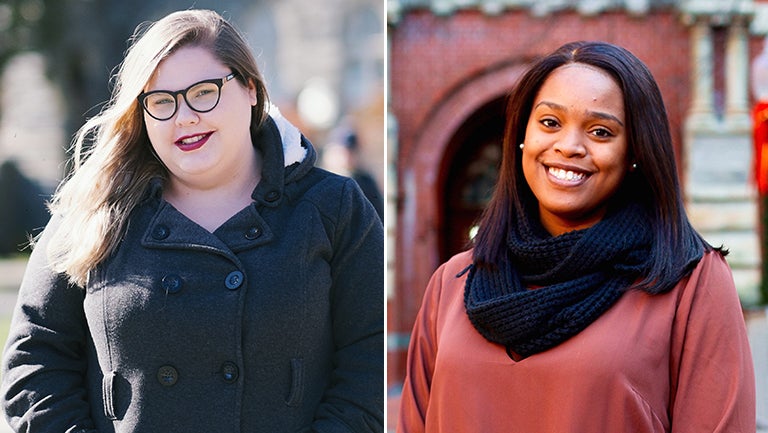Title: Truman Scholarships Awarded to Two Outstanding Georgetown Students
Government majors Amanda Scott (C’19) and Shakera Vaughan (C’19) are among the 59 outstanding students selected for the prestigious 2018 Harry S. Truman Scholarship.

Government majors Amanda Scott (C’19) and Shakera Vaughan (C’19) are among the 59 outstanding students from 52 institutions selected as 2018 Harry S. Truman Scholars.
The students are also both members of the Georgetown Scholarship Program (GSP), which provides programmatic and financial support for low-income and first-generation students.
The Truman Scholarships offer students $30,000 toward graduate school tuition, and are awarded annually to students across the country who demonstrate exceptional leadership and an interest in public service.
Melissa Morgan (C’19), another government major in the College, was a finalist for the award.
This marks the second consecutive year that multiple Georgetown students have been named Truman Scholars. Cristine Stark (SFS’18) and Daniel Wassim (SFS’18) each won scholarships last year.
Public Interest Law
Scott hopes to use her Truman Scholarship to attend law school.
Having experienced poverty growing up in Mobile, Alabama, she is interested in pursuing public interest law and advocacy work for poor and marginalized communities.
Scott, who was home-schooled, earned her General Equivalency Diploma and then enrolled in Coastal Alabama Community College’s two-year paralegal studies program.
After graduating summa cum laude and setting her sights on four-year institutions, she chose Georgetown for its Washington, D.C., location, service-oriented mission and GSP.
Making Best Friends
“I’m a proud member of the Georgetown Scholarship Program,” Scott says. “Some of the best friends I’ve made at Georgetown are GSPers.”
With the support of GSP, Scott dove headfirst into her coursework, focusing on classes on government and history.
She credits her U.S. history seminars, taught by history professor Michael Kazin, and an introduction to journalism class taught by emeritus professor of practice Barbara Feinman Todd as helping her develop academically.
“These classes helped me hone my research and investigative skills, but they also taught me about myself and my passions, through seeing what I chose to write about when given absolute freedom,” Scott says.
‘Good Enough’
At Georgetown, Scott has interned at the Lawyer’s Committee for Civil Rights, the office of D.C. Mayor Muriel Bowser and the Civil Rights Division at the U.S. Department of Justice.
When she learned about the Truman Scholarship from the Georgetown Office of Fellowships, Awards and Resources, she knew it could help her achieve her goals.
“I’ve gone through a lot in my life to get to this point and to stay here,” she says. “I applied because I wanted to show myself that I am good enough –that people like me are good enough.”
Life-Changing Scholarship
Vaughan, from Richmond, Virginia, says the Truman Scholarship represents a life-changing opportunity.
“This scholarship means everything to me, because it makes graduate school an option now,” she explains. “It brings tears to my eyes knowing that the people who sat on my panel believed in my vision and wanted to help me accomplish this.”
Vaughan plans to use her Truman Scholarship to pursue a master’s degree in public administration in fall 2019.
Endless Opportunities
While at Georgetown, she has volunteered in local schools, worked in a church nursery, and interned for Sen. Tim Kaine (D-Virginia) and for the offices of former President Barack Obama and First Lady Michelle Obama.
She also joined theGospel Choiras well as theBaker Scholars, one of Georgetown’s most prestigious undergraduate programs, became vice president of GU Women of Color and helped organize theBRAVE Summit, which celebrates and promotes the voices of African American women.
Like Scott, Vaughan chose Georgetown because of resources and programs the university commits to helping students from all backgrounds thrive, such as those provided by GSP and theCenter for Multicultural Equity and Access (CMEA).
“Georgetown not only gave me the financial support to come here, but also gave me the resources to stay here,” she says. “I knew the opportunities in the nation’s capital were endless, and I wanted to try and take advantage of what is supposed to be the ‘best four years of my life.’”
Strong Sisterhood
Like many first-year students, Vaughan took some time to adjust to college life.
“I didn’t quite feel like I belonged,” she said. “I had experienced imposter syndrome.”
But she said involvement in campus clubs – particularlyGUWOC –helped her feel more invested in her new home.
“I was given a strong sisterhood of such phenomenal and welcoming women,” Vaughan says. “Not only did I finally feel like I belonged, but I was a part of an organization that really set out to advocate for marginalized groups of people.”
She took full advantage of the academic opportunities afforded her, enrolling in courses that helped her explore fascinating new ideas.
“One lesson that I quickly realized was that my professors have so much wisdom to offer in and outside the classroom, and all you had to do was talk to them,” she said.
Giving Back
She said courses such as Education/Politics/Policymaking taught by government professor Douglas Reed and Public Housing: Theory and Practice, taught by sociology professor Brian McCabe, pushed her to “think outside of my normal realm.”
Wherever her journey leads her, she says she’ll keep her roots in mind.
“I am doing all of this for my community back home,” Vaughan says. “Ultimately, it is the city of Richmond that drives me towards my goals.”